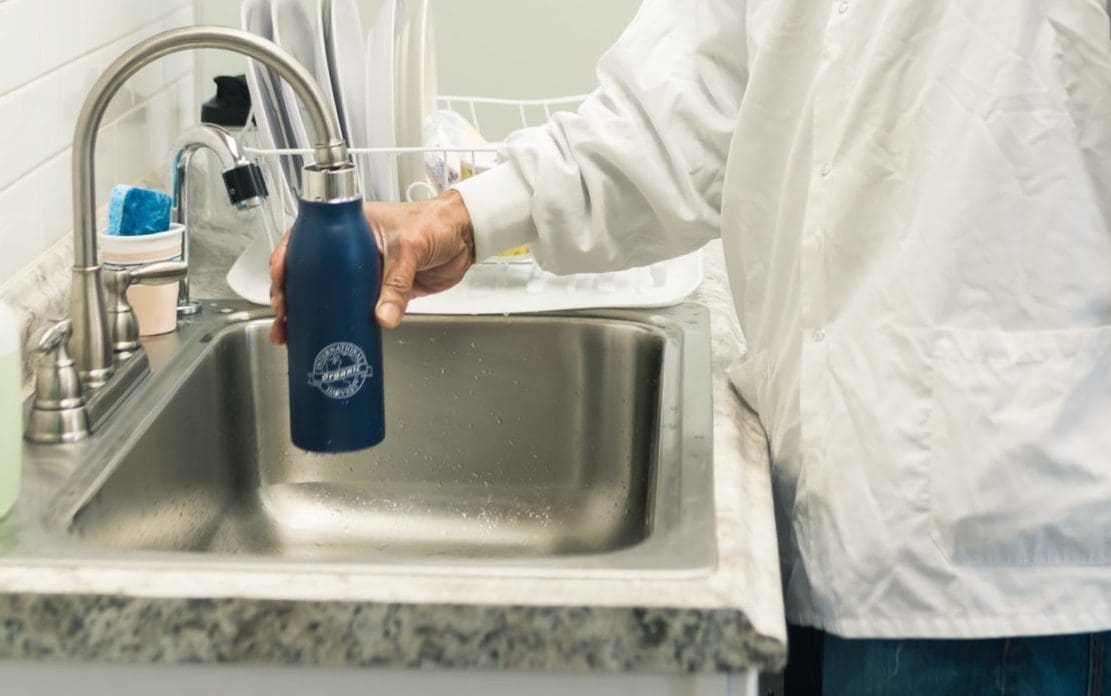Why Does My Water Stink?

When filling up a glass of water to quench your thirst, there’s nothing worse than being overwhelmed by the smell of rotten eggs, sewage, or a swimming pool. Homeowners sometimes experience unpleasant odors coming from their faucets. A 2019 Consumer Reports survey found that nearly half of Americans who drink city water have experienced displeasing odors coming from their tap water. In many of these cases, the cause of the odor can’t be determined by water testing, so Office H2O has compiled this helpful guide to explain why your tap water may smell bad and how you can treat it!
Rotten Eggs or Sewage Odor
One of the most common complaints of odors emanating from household taps is of rotten eggs or sewage. The rotten egg smell is often compared to a sulfurous scent. This stench is usually due to bacteria growing in your water system. The most common place for the bacteria to grow is in the drain. Bacteria from soap and food waste can accumulate in the drain, creating a heavy gas that sits in the pipes. When the faucet is turned on, water pushes the gas out through the tap, making it seem as if the water stinks. If you think this may be happening to your water, fill a glass with water from the tap, walk to another room and smell the water. If the water doesn’t smell, then the source of the bacteria and resultant odor is the drain.
Bacteria growing in your water heater can also create a rotten egg or sewage odor. This usually happens after the hot water has been unused for a period of time, such as when you go on vacation. Bacteria that naturally occur in the water react with parts of the water heater to produce hydrogen sulfide gas, the source of the rotten egg smell. If you notice the odor when you run hot water but not cold, the source is likely your water heater.
If you think the odor is coming from bacteria in your drain, you may be able to resolve the issue by disinfecting and flushing the drain with hot water and soap. If you suspect the problem is bacteria in your water heater, you can turn up the temperature for 24 hours and run hot water to kill and flush bacteria from the pipes. If this does not resolve the odor, a licensed plumber can replace the rods in the heater.
Bleach or Chemical Odor
Another common complaint of odors coming from taps is that of a bleach or chemical smell. This issue arises from too much chlorine in the water. The Environmental Protection Agency mandates that chlorine be added to water during treatment processes as it is the best disinfectant; the chlorine kills bacteria, viruses, and parasites in drinking water. However, sometimes too much chlorine is added, resulting in a bleach odor coming from household taps. The smell resolves when the chlorine completely dissipates. If your tap is releasing a chlorine smell, try running your outside faucets for several minutes to leach out the excess chlorine.
Moldy or Fishy Odor
Many homeowners have also complained of a moldy or fishy smell coming from their water taps. This odor can be due to several different issues. Decaying organic matter in the drain or well may be causing the odor; surface runoff can often deposit debris and other contaminants into water sources that result in a moldy or fishy scent. Certain metals such as barium or cadmium can also seep into wells and pipes, resulting in this type of scent.
Another source of such an odor could be the reservoir or pressure tank. Sometimes, certain types of fungi or algae can make their way into the reservoir or pressure tank, affecting the water odor. If you suspect that any of these issues may be resulting in your water smelling like mold or fish, be sure to sanitize the sources and pump out water until the smell dissipates. If the problem continues, you can install an activated carbon filter to help control the stench.
Office H2O Bottleless Water Coolers
If you are concerned about the safety of your drinking water or are just fed up with pesky odors coming from your tap, consider investing in one of Office H2O’s bottleless water coolers! Our devices come equipped with the latest water purification technology, employing a 9-stage filtration process to ensure your water is safe to drink and odor-free!
Another feature that makes our bottleless water coolers essential, especially during the pandemic, is the Touch-Free feature. At Office H2O, we take sanitation seriously. In addition to our self-sanitizing tanks and multi-stage filtration, we are now providing touch-free bottleless water coolers. Using the stylish foot pedal included in our bottleless water coolers, you can continue to enjoy easy access to purified drinking water in your home or office without having to use your hands.
To find out more about our bottleless water coolers and how Office H2O can help provide safe, clean drinking water for you and your family, visit our website today.
Photo by The Creative Exchange on Unsplash
